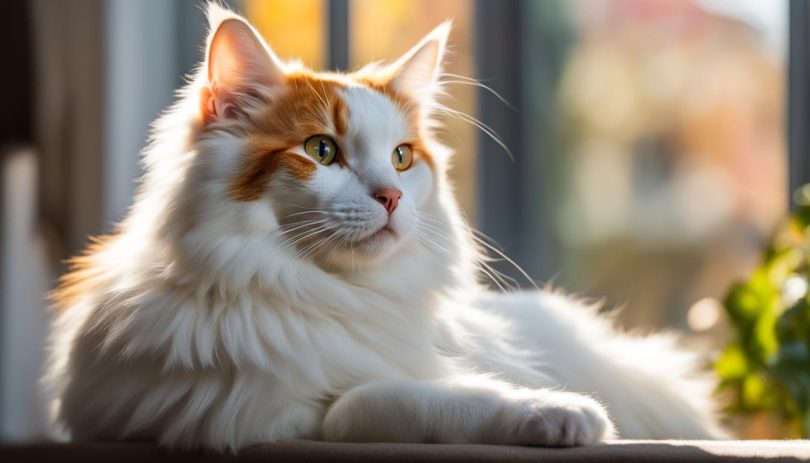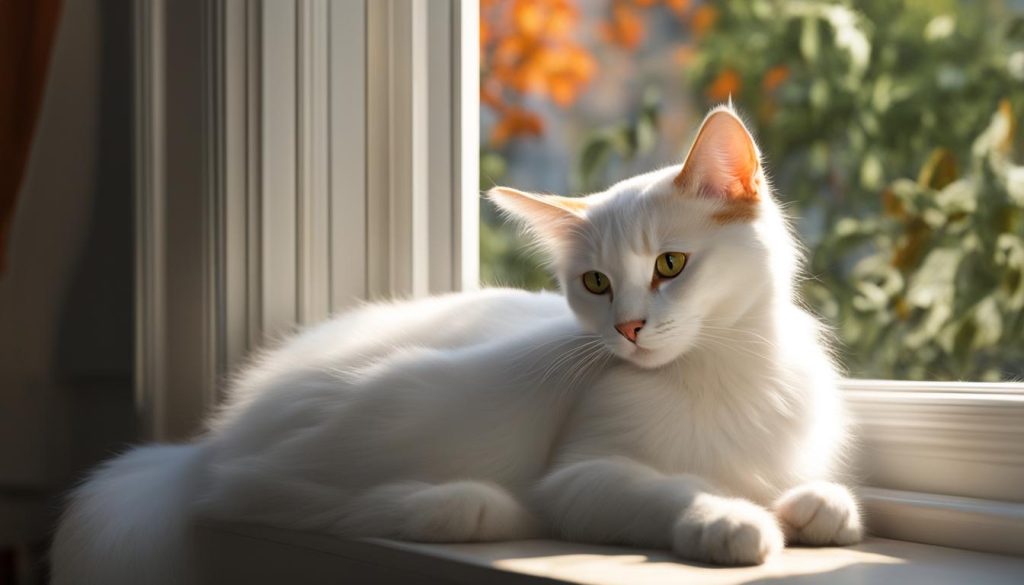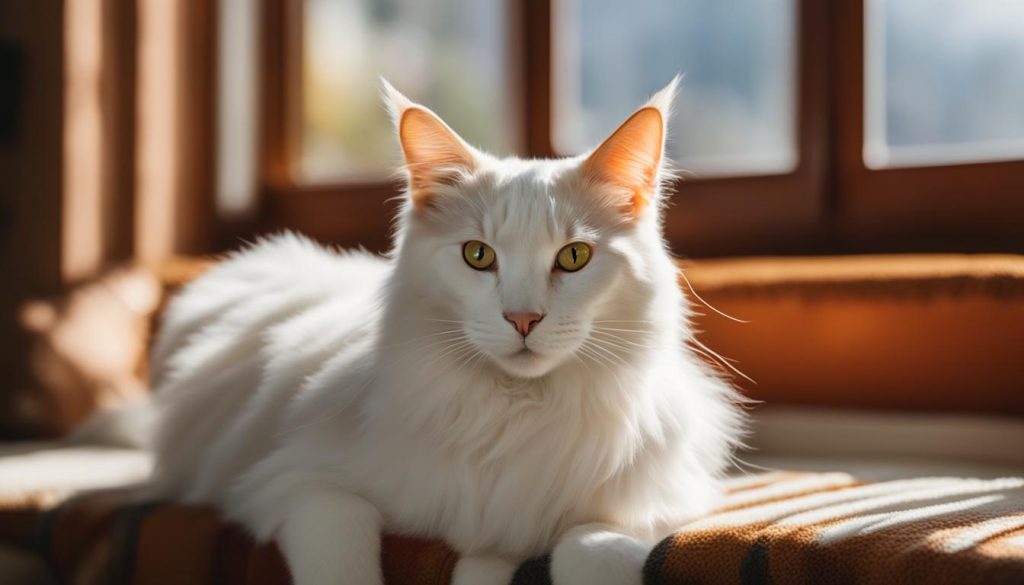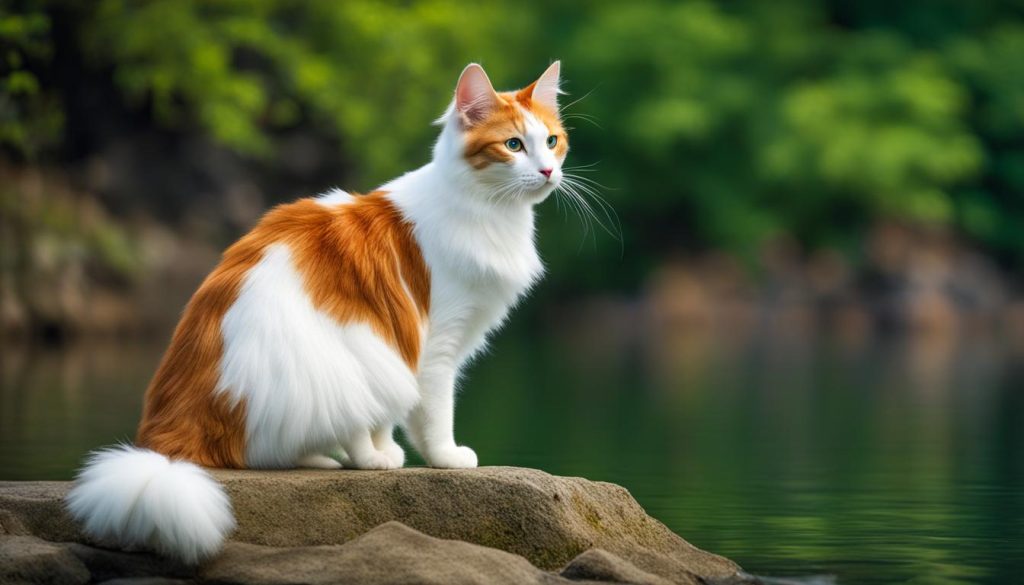Are you considering getting a Turkish Van cat but worried about allergies? In this article, I will provide you with the facts about Turkish Van cats and their hypoallergenic status. Despite their name, Turkish Van cats are not hypoallergenic. Let’s dive into the details to understand why.
Turkish Van cats are a unique breed that originated in the Lake Van region of Turkey. Known for their stunning white coat with colored markings on the head and tail, these cats weigh between 10-18 lbs and have a lifespan of twelve to seventeen years. However, it’s important to note that Turkish Van cats, like most other breeds, are not hypoallergenic.
Despite their beautiful appearance, Turkish Van cats do produce dander, which can trigger allergies in sensitive individuals. It’s crucial to understand that there isn’t a cat breed that is completely hypoallergenic, as allergen reactions can vary from person to person.
Key Takeaways:
- Turkish Van cats are not hypoallergenic.
- They have a white coat with color on the head and tail.
- They weigh between 10-18 lbs and have a lifespan of twelve to seventeen years.
- Turkish Van cats produce dander, which can trigger allergies.
- No cat breed is completely hypoallergenic, as allergens can vary from person to person.
Characteristics of Turkish Van Cats
Turkish Van cats are a unique breed known for their distinct characteristics that set them apart from other cat breeds. Here are some key features that make them special:
1. Love for Water
Turkish Van cats have a fascinating affinity for water, earning them the nickname “the swimming cat.” Unlike most cats, they enjoy splashing around and playing in water. This behavior is believed to be a result of their origin near Lake Van in Turkey. So, if you have a Turkish Van cat, don’t be surprised if they join you in the bathtub or try to take a dip in the pool!
2. Active Nature
The Turkish Van breed is known for its high energy levels and constant movement. They are like little caravans, always on the go and exploring their surroundings. If you’re looking for an active and playful cat, the Turkish Van might be the perfect match for you. They thrive in environments that provide them with plenty of mental and physical stimulation.
3. Health and Coat
Turkish Van cats are generally healthy cats, but like any breed, they have their vulnerabilities. One common health concern for Turkish Vans is hypertrophic cardiomyopathy, the most common heart disease in cats. Therefore, regular veterinary check-ups are essential to ensure their well-being.
When it comes to grooming, Turkish Van cats have a semi-long coat that is often described as feeling like cashmere. Their fur is soft, silky, and doesn’t have a woolly undercoat, which makes it easier to maintain. Regular combing, about once a week, is usually sufficient to keep their coat in good condition.
4. Affectionate and Independent
Turkish Van cats are known for their independent nature. While they enjoy spending time with their human companions, they also appreciate having their own space and freedom. They are playful and affectionate cats, but they may not be as fond of being held or restrained for long periods of time. It’s important to respect their boundaries and give them the space they need.
Overall, Turkish Van cats are a unique and captivating breed with their love for water, active nature, and distinctive coat. If you’re considering adding a Turkish Van to your family, make sure you provide them with plenty of mental and physical stimulation to keep them happy and healthy.
The Personality of Turkish Van Cats
Turkish Van cats have a unique and captivating personality. They are known for their playful, energetic nature and their curiosity about the world around them. These cats love to explore their surroundings and can often be found jumping and climbing to high places. They have a natural instinct for hunting and may enjoy interactive toys that allow them to indulge in their hunting skills.
While Turkish Vans are affectionate and enjoy cuddling with their owners, they are not the type of cat that likes to be held or restrained for long periods. They prefer their independence and may need some time to warm up to new people or situations. However, once they feel comfortable, they can be incredibly loyal and loving companions.
Turkish Van cats are generally friendly and get along well with other pets in the household. However, they may require some familiarization before living with young children. Their energetic nature and strong jumping ability can sometimes make them a bit too enthusiastic for small children who may inadvertently provoke them. It’s important to supervise their interactions and teach children how to properly handle and respect these cats.
The Personality Traits of Turkish Van Cats:
- Energetic and playful
- Curious and adventurous
- Independent
- Affectionate but not fond of being held
Grooming and Care for Turkish Van Cats
Turkish Van cats have a semi-long coat that requires minimal grooming. Their coat is silky and feels similar to cashmere. Regular combing, about once a week, should be sufficient to keep their coat in good condition and minimize shedding. However, it’s important to note that even though they have low shedding, they are not hypoallergenic. Their coat may still produce dander that can aggravate allergies in sensitive individuals.
In addition to grooming, providing Turkish Van cats with regular exercise and playtime is essential for their overall well-being. They are an active breed and need mental and physical stimulation to prevent boredom and obesity. Interactive toys and scratching posts can help keep them entertained and provide an outlet for their natural instincts. Engaging in play sessions with them can also strengthen the bond between you and your cat.
When it comes to feeding Turkish Van cats, a balanced and nutritious diet is important. Consult with your veterinarian to determine the appropriate type and amount of food to provide for your cat based on their age, weight, and activity level. It’s also crucial to provide them with fresh water at all times to keep them hydrated.
“Regular combing, about once a week, should be sufficient to keep their coat in good condition and minimize shedding.”
Grooming and Care for Turkish Van Cats: Summary
- Turkish Van cats have a semi-long coat that requires minimal grooming.
- Regular combing, about once a week, is sufficient to keep their coat in good condition.
- They are not hypoallergenic and may still produce dander that can trigger allergies.
- Provide regular exercise and playtime to keep them mentally and physically stimulated.
- Offer a balanced and nutritious diet recommended by your veterinarian.
- Ensure access to fresh water at all times for proper hydration.
Grooming and Care for Turkish Van Cats: Table
| Grooming Aspect | Details |
|---|---|
| Coat Length | Semi-long |
| Grooming Frequency | About once a week |
| Shedding | Low |
| Allergenicity | Not hypoallergenic; may produce dander |
| Exercise Needs | Regular exercise and playtime required |
| Diet | Consult with veterinarian for balanced and nutritious food |
| Hydration | Access to fresh water at all times |
Turkish Van Cats and Allergies
While Turkish Van cats are not hypoallergenic, individuals with allergies may have different reactions to different cat breeds. Some people with allergies may find that they can tolerate certain cat breeds better than others. However, it’s important to note that there isn’t a cat breed that is completely hypoallergenic. It’s always recommended to spend time with the cat before bringing them into your home to see if you have any allergic reactions.
Allergies and Cat Breeds
Allergies to cats are caused by a protein called Fel d 1, which is found in the saliva, urine, and dander of cats. Some cat breeds may produce less of this protein or have different coat types that may reduce the amount of allergens in the environment. However, it’s important to understand that individual responses to cat allergens can vary, and what works for one person may not work for another.
There are cat breeds that are often recommended for individuals with allergies, such as the Siberian cat, Balinese cat, and the Sphynx cat. These breeds are said to produce fewer allergens or have coats that are less likely to trigger allergies. However, it’s important to consult with an allergist or spend time with the specific cat breed before making a decision, as individual sensitivities can still vary.
| Cat Breed | Allergenicity | Coat Type |
|---|---|---|
| Siberian Cat | Low | Semi-long |
| Balinese Cat | Low | Semi-long |
| Sphynx Cat | Low | Hairless |
Tips for Managing Cat Allergies
- Keep the home clean and free of dust and allergens by regularly vacuuming and dusting.
- Designate cat-free areas in the home, such as the bedroom, to create a sanctuary for allergy sufferers.
- Wash bedding and soft furnishings regularly to remove allergens.
- Consider using air purifiers or HEPA filters to help remove allergens from the air.
- Consult with an allergist for specific advice and treatment options.
Distinctive Coat Pattern
One of the standout features of Turkish Van cats is their coat pattern. They have a silky white coat with colored markings on their heads and tails, and sometimes on the back of their necks. This distinctive pattern adds to their overall charm and uniqueness. Additionally, their coats are soft and silky to the touch, giving them an elegant and luxurious appearance.
Playful and Energetic
Turkish Van cats are known for their playful and energetic nature. They have a high activity level and love to explore their surroundings. Their curious and adventurous personalities make them excellent companions for individuals or families who can provide them with plenty of mental and physical stimulation. These cats thrive in environments that offer opportunities for play and exercise.
| Turkish Van Cat Breed | Cat Breeds for Allergies |
|---|---|
| Originated in Turkey | May produce less dander |
| Distinctive coat pattern | Individuals with allergies may have different reactions |
| Playful and energetic | Not a completely hypoallergenic breed |
Overall, Turkish Van cats have a rich history and are beloved for their unique coat patterns and playful personalities. While they may produce less dander than some other cat breeds, they are not completely hypoallergenic. Individuals with allergies may have different reactions to Turkish Van cats, so it’s essential to spend time with them before deciding to bring one into your home.
Turkish Van Cats: Size and Appearance
Turkish Van cats are known for their unique size and appearance. They are a large and muscular breed, weighing between 10-18 lbs. Their body is strong and well-built, with a solid frame that showcases their athleticism. Turkish Van cats have a distinctive coat pattern, with a white body and colored markings on their head and tail. They may also have additional markings on the back of their neck. The combination of white and color creates a striking contrast that adds to their overall beauty.
The head of a Turkish Van cat is broad and rounded, with large, almond-shaped eyes that are expressive and captivating. Their ears are also large and set high on the head, giving them an alert and attentive appearance. The coat of Turkish Van cats is another distinguishing feature. It is long, soft, and silky, with no woolly undercoat. Their fur resembles cashmere, making them a delight to touch and pet.
Turkish Van cats also have unique fea
Turkish Van Cats as Pets
As a proud owner of Turkish Van cats, I can attest to the joy and liveliness they bring to a home. These cats are energetic and playful, always up for a game or a romp around the house. They have a natural curiosity and love exploring their surroundings. Turkish Van cats are known for their jumping ability, and it’s not uncommon to find them perched on high surfaces, ready to pounce on a toy or observe their surroundings from above.
It’s important to note that Turkish Van cats are not suitable for families with young children. While they can be friendly and affectionate, they are not tolerant of tail-tugging or excessive petting. They prefer to be admired from a respectful distance and may require some time to warm up to new people or unfamiliar environments. Despite their independent nature, they still crave attention and interaction from their human companions.
Grooming Turkish Van cats is relatively easy due to their silky coat. Regular combing, about once a week, is sufficient to keep their fur in good condition and minimize shedding. Turkish Van cats are not hypoallergenic, as they can produce dander that may trigger allergies in sensitive individuals. However, their low-shedding coat does help in reducing the amount of loose hair around the house.
Key Points:
- Turkish Van cats are energetic and playful, perfect for owners who can provide them with regular exercise and playtime.
- They are not suitable for families with young children due to their intolerance of excessive handling.
- Regular grooming is required to keep their coat in good condition, but they are not hypoallergenic.
In summary, Turkish Van cats make wonderful pets for individuals or families without allergies. They are active, playful, and require regular mental and physical stimulation. If you’re considering adding a Turkish Van cat to your family, be prepared to provide them with plenty of attention, playtime, and a safe environment to satisfy their natural curiosity.
Turkish Van Cats and Cat Allergies
While Turkish Van cats are not hypoallergenic, some individuals with cat allergies may find that they have fewer allergic reactions to certain cat breeds. However, it’s important to note that allergens can vary from person to person, and there isn’t a cat breed that is completely allergy-free. It’s always recommended to spend time with a cat before bringing them into your home if you have allergies to see how you react.
When it comes to cat allergies, it’s essential to understand that it’s not just the cat’s fur that can cause allergic reactions. Cats produce allergenic proteins primarily found in their saliva, urine, and dander. These proteins can be carried on the cat’s fur and transferred to your clothes, furniture, and the air in your home. This is why even cats with low dander or minimal shedding can still trigger allergies in sensitive individuals.
The Myth of Hypoallergenic Cat Breeds
“There isn’t a cat breed that is completely hypoallergenic.”
The term “hypoallergenic” is often used to describe cat breeds that are believed to produce fewer allergens. However, it’s important to understand that no cat breed is truly hypoallergenic. The level of allergens produced can vary from cat to cat, even within the same breed. What may be tolerable for one person with cat allergies may trigger severe reactions in another individual.
If you’re considering getting a cat and you have allergies, it’s recommended to spend time with different breeds and individual cats to see how you react. Some people with allergies may find that they can tolerate certain breeds or individuals better than others. However, it’s always best to consult with an allergist or immunologist who can provide personalized advice based on your specific allergies and sensitivities.
| Cat Breed | Allergenicity | Characteristics |
|---|---|---|
| Turkish Van | Not hypoallergenic | Active, affectionate, love for water |
| Russian Blue | Lower allergenicity | Gentle, intelligent, short coat |
| Siberian | Lower allergenicity | Playful, loyal, thick and water-resistant coat |
Care and Maintenance of Turkish Van Cats
When it comes to caring for Turkish Van cats, their unique coat requires minimal grooming. Regular combing, about once a week, is sufficient to keep their silky coat in good condition and minimize shedding. While Turkish Van cats are not hypoallergenic, their low-shedding coat may produce less dander compared to other breeds, which can be beneficial for individuals with allergies.
In addition to grooming, providing regular exercise and playtime is crucial for the well-being of Turkish Van cats. These active and intelligent cats thrive when they have opportunities for mental and physical stimulation. Interactive toys, climbing structures, and puzzle feeders can help keep them entertained and prevent obesity.
Diet and Nutrition
Proper nutrition is essential to maintain the overall health of Turkish Van cats. It is important to feed them a balanced and nutritious diet that meets their specific needs. Consult with a veterinarian to determine the appropriate amount and type of food for your Turkish Van cat, taking into consideration factors such as age, weight, and activity level. High-quality cat food, both wet and dry, formulated for the needs of adult cats is generally recommended.
| Nutrition Tips for Turkish Van Cats | |
|---|---|
| Provide a balanced and nutritious diet | |
| Ensure access to fresh, clean water at all times | |
| Avoid feeding excessive treats or human food | |
| Monitor their weight and adjust food intake accordingly | |
| Consider consulting with a veterinarian for dietary recommendations |
By providing proper care and attention to your Turkish Van cat, you can ensure they lead a happy and healthy life. Remember to spend time with them, provide regular exercise, and visit a veterinarian for routine check-ups and vaccinations. With their unique and charming personalities, Turkish Van cats can make wonderful companions for individuals and families who are not allergic to cats.
Turkish Van Cats and Adoption
If you’re considering adopting a Turkish Van cat, it’s important to be aware that they are not hypoallergenic. While they may produce less dander than some other cat breeds, they can still trigger allergies in sensitive individuals. It’s recommended to spend time with the cat before adoption to see if you have any allergic reactions. Adoption is a great way to provide a loving home to a cat in need, and there are many Turkish Van cats available for adoption through shelters and rescue organizations.
When adopting a Turkish Van cat, you’ll have the opportunity to give a second chance to a cat that may have had a difficult past. These cats can bring lots of joy and companionship to your life, and by adopting, you’re giving them a chance to live a happy and fulfilling life. Turkish Van cats are known for their playful and energetic nature, and they can be a great addition to a family or a single person looking for a loyal feline companion.
Before adopting, make sure you have the time and resources to properly care for a Turkish Van cat. They will require regular grooming, exercise, and mental stimulation. It’s important to provide them with a nutritious diet and regular veterinary care to ensure their health and well-being. Remember, adopting a cat is a long-term commitment, so make sure you’re ready for the responsibility.
Benefits of Adopting a Turkish Van Cat
- Provides a loving home to a cat in need
- Brings joy and companionship to your life
- Playful and energetic nature
- Loyal feline companion
- Opportunity to give a second chance to a cat with a difficult past
| Turkish Van Cats and Adoption | Benefits |
|---|---|
| Turkish Van cats are not hypoallergenic | Provides a loving home to a cat in need |
| Spending time with the cat before adoption | Brings joy and companionship to your life |
| Turkish Van cats require grooming, exercise, and mental stimulation | Playful and energetic nature |
| Provides nutritious diet and regular veterinary care | Loyal feline companion |
| Long-term commitment | Opportunity to give a second chance to a cat with a difficult past |
Conclusion
In conclusion, Turkish Van cats are not hypoallergenic. While they may produce less dander than some other cat breeds, they can still trigger allergies in sensitive individuals. It’s important to spend time with a cat before bringing them into your home if you have allergies to see if you have any allergic reactions.
Turkish Van cats are active, playful, and require regular grooming and exercise. Despite not being hypoallergenic, they can make wonderful pets for individuals and families who are not allergic to cats and can provide them with the care and attention they need.
If you’re considering adopting a Turkish Van cat, it’s important to be aware of their potential to cause allergies. Adoption is a great way to provide a loving home to a cat in need, and there are many Turkish Van cats available for adoption through shelters and rescue organizations.
FAQ
Are Turkish Van cats hypoallergenic?
No, Turkish Van cats are not hypoallergenic. They do produce dander, which can trigger allergies in sensitive individuals.
Do Turkish Van cats shed a lot?
Turkish Van cats have a semi-long coat that requires minimal grooming. While they do shed, regular combing, about once a week, should be sufficient to keep their coat in good condition.
Can I find Turkish Van cats for adoption?
Yes, there are Turkish Van cats available for adoption through shelters and rescue organizations. Adoption is a great way to provide a loving home to a cat in need.
What is the average lifespan of a Turkish Van cat?
Turkish Van cats typically live between twelve and seventeen years of age.
Are Turkish Van cats good with children?
Turkish Van cats can be independent and may require familiarization before living with children. They are generally friendly but may not be the best choice for families with young children.
Do Turkish Van cats require a lot of grooming?
Turkish Van cats have a silky coat that requires minimal grooming. Regular combing, about once a week, should be sufficient to keep their coat in good condition.
Are there any health issues common in Turkish Van cats?
Turkish Van cats can be prone to hypertrophic cardiomyopathy, the most common heart disease in cats. Regular veterinary check-ups are recommended to monitor their health.
Are Turkish Van cats good for apartment living?
Turkish Van cats are an active breed and require regular exercise and playtime. While they can adapt to apartment living, they do best in homes with plenty of space to roam and explore.
Can Turkish Van cats swim?
Yes, Turkish Van cats are known for their love of water and have been given the nickname “the swimming cat.”
Do Turkish Van cats get along with other pets?
Turkish Van cats can be sociable and may get along well with other pets if properly introduced. However, each cat has a unique personality, and it’s important to monitor their interactions.









